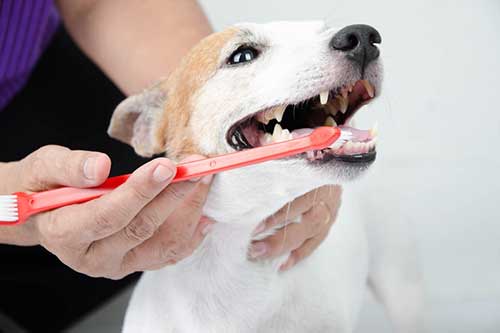
Just like humans, dogs can suffer from health complications if their teeth aren’t properly maintained. Appropriate oral hygiene can extend your dog’s life by up to four years if you are committed to daily maintenance and regular checks. The Kirrawee Veterinary Hospital team is here to bring you the facts about canine dental care so you know how to protect your dog’s oral health.
Just like humans, dogs can suffer from health complications if their teeth aren’t properly maintained. Appropriate oral hygiene can extend your dog’s life by up to four years if you are committed to daily maintenance and regular checks. The Kirrawee Veterinary Hospital team is here to bring you the facts about canine dental care so you know how to protect your dog’s oral health.
Dental problems are common in older dogs; however, we do see younger dogs suffer from poor oral health due to their diet. It only takes between three and five days for plaque to appear on healthy teeth and if you leave the problem untreated, the plaque hardens into tartar.
Tartar causes gingivitis and bad breath, progressing into ulcers and loose teeth. If your dog suffers from an infection due to gingivitis, the resulting medical conditions can be life-threatening. These include kidney failure and heart failure which is why it’s so important to start your dog’s oral health routine early.
The most common signs of dental disease are:
There are many ways to prevent dental disease in dogs and minimise the risk factors – some of them are similar to how humans do it.
Just like in humans, the easiest way to remove plaque and tartar from your dog’s teeth is with regular brushing. To create an oral hygiene program that your dog will love, follow the steps below.
Hard food with a dental tick of approval is great for protecting your dog’s teeth, reducing plaque and bacteria, and stimulating the gums. Additionally, you can give your dog a raw bone once a week to minimise the risk of dental disease.
If you’re just starting out with your dental routine, the first step is visiting your local vet. The team at Kirrawee Veterinary Hospital offer dental check-ups where we will examine your dog’s teeth and restore their condition with a professional clean. Call (02) 9521 6422 or contact us online to make an appointment.